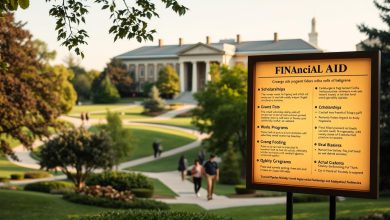Financial Aid Myths That Could Be Hurting Your Study Abroad Plans
Many students believe in myths about financial aid that stop them from studying abroad. This is especially true for students in Nigeria. These false beliefs can cause bad financial decisions.
Anúncios
They might stop you from getting good education opportunities worldwide. It’s important to know how these myths affect study abroad funding. By understanding these myths, students can make better choices for their international studies.
Understanding the Importance of Financial Aid for Study Abroad
The importance of financial aid study abroad is key to opening the world to students. It helps make global learning possible for many. With aid from governments, schools, and private funds, students can study in different countries.
Financial aid lets students dive into new cultures and study settings while worrying less about money. This support helps them concentrate on learning and growing. Studies show more students go abroad when financial aid is easy to get.
Financial aid for studying abroad comes in many forms. Scholarships can pay for classes, travel, and living costs. It’s crucial for students to know about their financial aid choices. This knowledge can open doors to studying in new places. Such support not only boosts their learning but also enriches their time away.
Common Financial Aid Myths Study Abroad
Many students looking to study abroad face common financial aid myths. These can stop them from chasing this life-changing chance. The wrong ideas about money can block paths, especially concerning wealth and studying in another country. It’s key to bust these myths so students see the aid waiting for them.
Myth: Only Wealthy Students Can Study Abroad
Some think only the rich can afford international study. But, there’s a lot of aid for all kinds of financial backgrounds. Schools provide scholarships and grants geared towards helping those with less money. Actually, many who study abroad don’t come from wealthy homes.
Myth: Financial Aid Doesn’t Cover International Programs
Many believe aid is only for studies in their own country. This stops them from looking into studying elsewhere. But a lot of aid exists for learning abroad. Scholarships, grants, and loans can often be used for these programs. This lets students take their education global without massive costs.
Debunking Common Financial Aid Myths
Many myths mislead students about study abroad financial aid. It’s vital to correct these for Nigerian students eyeing international education. Often, these myths come from not knowing the facts, causing needless worry about fund eligibility and access.
It’s important to clear up these misunderstandings about study abroad. Not all funding is based on high grades alone; many scholarships and grants are open to a wide range of students. This means many students have a chance, even if they think they don’t.
Students should research well, get advice from educational advisors, and talk to financial aid offices. Doing so helps them find financial help that fits their study goals. With the right info, students can properly explore the financial aid that’s available.
Study Abroad Funding Misconceptions
Many students think studying abroad costs too much. This leads to study abroad funding misconceptions. These wrong ideas stop many from chasing their dreams of learning in another country. Knowing the real cost of study abroad is key for those thinking about making this big move.
Tackling the Myth of High Costs
People often believe studying abroad is always expensive. Yet, there are many budget-friendly choices available. These include scholarships, grants, and low-cost school options. Schools often have special lower prices for students from other countries.
Additionally, there are programs for many financial situations. These do not cut down on quality or the learning you get.
Myth: Scholarships Are Only for Top Academic Performers
Many believe only the best students get scholarships. But, lots of awards look at different things. They might consider your financial need, what you want to study, or your cultural background.
It’s important to check out many scholarships. There’s a wide variety, not just for those with the best grades.
Exploring Financial Aid Resources for Study Abroad
Students wanting to study abroad can find many financial aid resources to help them. They need to know what aid is available to plan their overseas education costs. There are many funding options, made for different needs and achievements.
Types of Financial Aid Available
There are many kinds of financial aid for students. Let’s look at the main types:
- Scholarships: Based on merit, these do not have to be paid back. The Fulbright Program offers scholarships for studying abroad.
- Grants: Need-based aid that doesn’t need repayment. The Pell Grant is one example used by students abroad.
- Loans: These must be repaid, with interest. Education loans from banks or governments can help with abroad study costs.
- Work-Study Programs: Some schools let students work part-time to help pay for studies abroad.
Scholarships vs. Grants: What’s the Difference?
It’s important to understand how scholarships and grants differ. Here’s a quick overview:
Scholarships usually require specific qualifications. Grants focus more on financial need and might not look at grades.
Both aid types are vital for studying abroad. Knowing about them helps students find the best funding.
Affordable Study Abroad Options
Many students think studying abroad is too expensive. But, affordable study abroad options do exist. They offer quality education without a hefty price tag. It’s important for students to look into budget-friendly programs. This helps them gain international experience without spending too much.
Finding Budget-Friendly Programs
Around the world, many institutions offer affordable programs. Students can check out community colleges that partner with universities abroad. These options usually have lower fees and living costs. Countries like Germany, Poland, and Mexico are great for affordable education and living. Students should also look for scholarships and government-funded programs. These can help make studying abroad more affordable.
Scholarships and Grants for Nigerian Students
There are scholarships aimed at Nigerian students, helping make international study more reachable. Universities like the University of Sussex and the University of Birmingham offer scholarships specifically for Nigerians. Besides these, groups like the American Association of University Women and the Mandela Washington Fellowship provide funds for African students. Nigerian students should definitely explore these scholarships. They can greatly reduce the cost of studying abroad.
Tips for Financial Aid Study Abroad Applications
Studying abroad is exciting, but getting financial aid is key. It’s important to show your achievements and goals clearly. For Nigerian students, explaining your financial needs well can really help. Here are some tips to guide you through the process and what mistakes to avoid.
How to Prepare a Strong Application
First, find out what financial aid is out there for you. Make sure to collect all the needed documents early. This makes applying easier and helps you meet all the deadlines. Adding a personal statement can show your dreams and how studying abroad fits into your future. Always check your writing and get advice from friends or teachers.
Common Mistakes to Avoid
Many students forget key parts of the application, which can ruin their chances. Not having all your documents or missing a deadline are big problems. To avoid stress, start early and set reminders for yourself.
Be careful with your financial information to avoid any mistakes. It’s important to show your needs accurately. Getting help from a financial advisor can be a good idea.
| Mistake | Impact | Tip to Avoid |
|---|---|---|
| Incomplete Applications | Disqualification from consideration | Double-check all requirements before submission |
| Missing Deadlines | Loss of funding opportunities | Set calendar alerts for critical dates |
| Errors in Financial Projections | Misrepresentation of financial need | Review and consult with financial advisors |
Debunking Study Abroad Cost Myths
Many students think studying abroad costs too much. This stops them from chasing their dreams. Debunking study abroad cost myths means looking closely at real costs like tuition and housing. People often believe studying abroad is too pricey. However, checking the facts shows it can be affordable. Many programs have good prices, and schools offer financial help.
Living expenses change from one country to another. Sometimes, students in Nigeria find it cheaper to live abroad. This is due to discounts and low-cost housing. Clarifying study abroad budgeting sheds light on scholarships. There are financial aids aimed at international students. This makes studying abroad more possible than some think.
Students can also make money while studying. They can work part-time or do internships. This extra income helps with their expenses. So, when you look into the costs and money-making chances, you can make a better budget for studying abroad.
Conclusion
Summarizing financial aid myths is key for students wanting to study abroad. Many wrong beliefs can make barriers that may lead to giving up or missing chances. By busting these myths, students can learn more about available financial help.
It’s crucial for students to understand how to navigate financial aid. They often miss out on scholarships and grants because of false ideas about who qualifies. This knowledge lets students make smarter choices for their study abroad plans.
Many global education experiences are possible for all students. With accurate information and support, they can face financial hurdles. This way, they can follow their dreams of studying and working internationally.
FAQ
What are some common financial aid myths regarding studying abroad?
How can Nigerian students find affordable study abroad options?
What types of financial aid are available for international students?
How do scholarships differ from grants?
What tips can help enhance financial aid applications for studying abroad?
What are some financial aid resources for studying abroad?
Are there scholarships targeted specifically at Nigerian students for studying abroad?
How do I debunk common misconceptions about study abroad costs?
Published on: 15 de April de 2025





